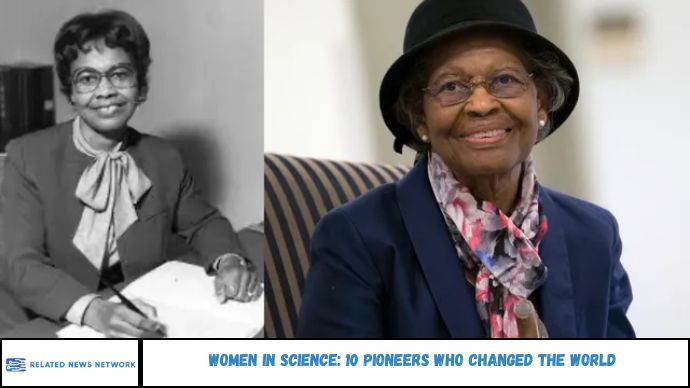When you think of the greatest scientists in history, who comes to mind? Probably names like Albert Einstein, Isaac Newton, or Galileo—icons whose groundbreaking work reshaped our understanding of the universe. And rightfully so.
But too often, the contributions of women in science are overlooked. Despite working in times when they were barred from formal education, denied access to laboratories, or excluded from academic societies, women have been pushing the boundaries of science for centuries. Only in recent decades have many of these pioneers begun to receive the recognition they’ve long deserved.
Yet for centuries, half of humanity—women—were often excluded from scientific recognition, their work overlooked or credited to male peers. Even today, women represent less than 30% of researchers worldwide, according to UNESCO. But that hasn’t stopped determined, brilliant women from changing the world through science.
In this article, you’ll meet 10 remarkable women in science who broke barriers, made groundbreaking discoveries, and left an enduring legacy. From unraveling the mysteries of DNA to revolutionizing space exploration, their contributions have shaped our modern world—and continue to inspire the next generation.
Abstract
This article highlights 10 pioneering women in science whose discoveries have changed the course of history. Learn about their groundbreaking work in physics, biology, medicine, mathematics, and more. From Marie Curie to Katherine Johnson, these women challenged the odds and redefined what was possible.
1. Marie Curie (1867–1934) – Pioneer of Radioactivity
- First woman to win a Nobel Prize, and the only person to win in two different sciences (Physics and Chemistry).
- Discovered polonium and radium, laying the foundation for cancer treatments and nuclear physics.
- Her research led to major advancements in medical imaging and radiotherapy.
Fact: Over 100 years later, her notebooks are still radioactive.
2. Rosalind Franklin (1920–1958) – DNA’s Hidden Hero
- Used X-ray crystallography to photograph DNA’s double helix structure.
- Her images were crucial to Watson and Crick’s model of DNA.
- Her work extended beyond DNA, contributing to virology and RNA research.
3. Katherine Johnson (1918–2020) – NASA’s Human Computer
- Mathematician who calculated flight paths for early space missions, including Apollo 11.
- Her work was critical to America’s space race success.
- Featured in the film Hidden Figures.
Fact: In 2015, she was awarded the Presidential Medal of Freedom.
4. Jane Goodall (1934–) – Revolutionized Primatology
- Spent 60+ years studying chimpanzees in Tanzania.
- Discovered that chimpanzees make and use tools—once thought to be uniquely human.
- Advocates for wildlife conservation and animal welfare globally.
5. Chien-Shiung Wu (1912–1997) – The First Lady of Physics
- Key contributor to the Manhattan Project.
- Disproved the law of parity, changing the course of particle physics.
- Her work helped shape our understanding of nuclear science.
6. Ada Lovelace (1815–1852) – The First Computer Programmer
- Worked with Charles Babbage on the Analytical Engine, an early mechanical computer.
- Wrote the first algorithm intended for machine processing.
- Often credited as the world’s first computer programmer.
7. Barbara McClintock (1902–1992) – Genetic Code Breaker
- Discovered “jumping genes” (transposons) in corn.
- First woman to receive an unshared Nobel Prize in Physiology or Medicine.
- Revolutionized the field of genetics and gene expression.
8. Dorothy Hodgkin (1910–1994) – Master of Molecular Structures
- Used X-ray crystallography to determine the structures of insulin, penicillin, and vitamin B12.
- Won the Nobel Prize in Chemistry in 1964.
- Her work helped improve treatments for diabetes and infections.
9. Mae Jemison (1956–) – First Black Woman in Space
- Flew aboard the Space Shuttle Endeavour in 1992.
- Trained as a physician and engineer.
- Advocates for STEM education and equality in science.
10. Tu Youyou (1930–) – Malaria Fighter and Nobel Laureate
- Discovered artemisinin, a life-saving drug that treats malaria.
- First Chinese woman to receive a Nobel Prize in Physiology or Medicine.
- Her discovery has saved millions of lives globally.
Why These Stories Matter
Despite their extraordinary achievements, many of these women were denied recognition during their lifetimes, faced gender bias, or worked in isolation. Today, their legacies serve as a call to:
- Celebrate underrepresented voices in science
- Encourage girls and young women to pursue STEM
- Promote equity and inclusion in research and academia
Stat: Women still account for only 33% of researchers worldwide (UNESCO, 2023).
FAQ
1. Who was the first woman to win a Nobel Prize?
Marie Curie, in 1903 for Physics—and again in 1911 for Chemistry.
2. What did Rosalind Franklin contribute to science?
She captured X-ray images that revealed DNA’s double helix structure.
3. Who was the first Black woman in space?
Mae Jemison, aboard the Space Shuttle Endeavour in 1992.
4. What did Katherine Johnson calculate?
She calculated critical flight paths for NASA space missions, including Apollo 11.
5. What is Tu Youyou known for?
She discovered artemisinin, a revolutionary anti-malarial drug.
6. Who is considered the first computer programmer?
Ada Lovelace, for her work on the Analytical Engine in the 1800s.
Conclusion
The women featured here weren’t just scientists—they were trailblazers who defied odds and reshaped entire fields. Their courage, curiosity, and commitment continue to inspire new generations of scientists across the globe.
As we look toward the future of innovation, we must also look back—and give credit where it’s long overdue. Supporting women in science isn’t just a matter of justice; it’s a matter of progress.







